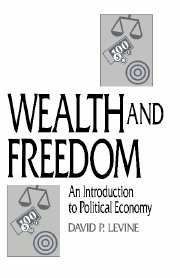Introduction
Published online by Cambridge University Press: 20 March 2010
Summary
The world we live in places special emphasis on private affairs. We have organized our social institutions, especially our economies, to facilitate the pursuit of private interests. In this world we think of the things we accomplish in our lives in a special way: They are primarily our own accomplishments, and they are meant to serve our private ends.
At the center of this private world is a system of private property. More than anything else, we need private property to satisfy our wants. The property system is one of producing, consuming, buying, and selling. This is the system we have come to refer to as our economy. It is a private property, private enterprise, market-centered economy.
Political economy studies the properties of this private world: How does it work, and how well does it satisfy our wants? What does it mean to us, and how does it form our lives and shape the ideas we have about ourselves? And, perhaps finally, what are its limits? After all, the world of private affairs is not our whole world – or is it?
Many argue that the world of private affairs can and should be the whole of our (social) world. They argue that the public dimension of our world ought to be as narrow as is consistent with making the private secure. Echoing Adam Smith, they argue that our government should limit itself to domestic and international security and to a few public works essential to economic intercourse but unlikely to be provided by private agents acting in their own interests.
- Type
- Chapter
- Information
- Wealth and FreedomAn Introduction to Political Economy, pp. 1 - 8Publisher: Cambridge University PressPrint publication year: 1995
- 7
- Cited by



